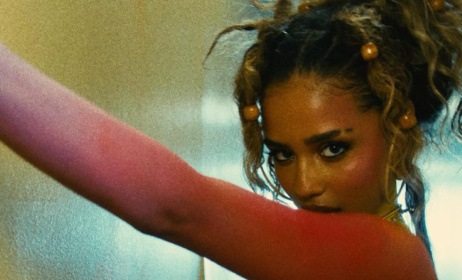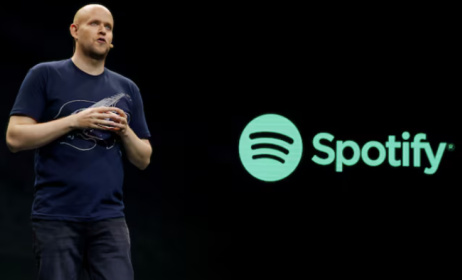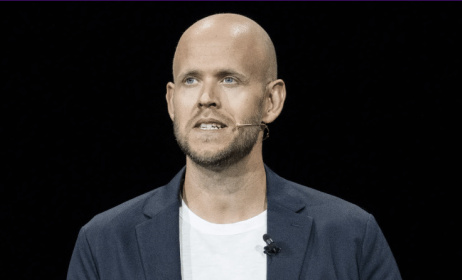Spotify’s Phiona Okumu reflects on DSP’s first year in West Africa
“How has the past year been since setting up shop in West Africa and what has the music industry in these parts taught you?” I ask Phiona Okumu, Spotify’s head of music for sub-Saharan Africa. She replies rhetorically: “Do you ever stop setting up shop in this Africa?”
 Spotify’s head of music for sub-Saharan Africa, Phiona Okumu.
Spotify’s head of music for sub-Saharan Africa, Phiona Okumu.
A year after the Swedish streaming service first arrived in Ghana, Okumu stresses that being involved in the music industry in the region is a continual journey of learning – no matter how much due diligence preceded the DSP’s foray into West Africa. It is the case even in South Africa, Spotify’s most mature market on the continent, she says.
Overall, it has been a positive first year, and Okumu admits to being “completely enamoured by the excitement her company has enjoyed”, despite waiting more than three years since Spotify first arrived on the continent to bring the service to the Afrobeats headquarters of Ghana and Nigeria.
“I’m just relieved that we took the time we did, because it took us a minute to come to the continent. We had to make sure that certain things were in place,” the Kenya-born Okumu says.
Perhaps, before the arrival of platforms such as Spotify in the region, there existed a perception that streaming would not be popular here. Okumu has found this to be untrue; it isn’t so much a case of people being averse to streaming as it is the scarcity of infrastructure, she argues. If anything, streaming has proven to be a more convenient way to consume music. Furthermore, “legitimate streaming” only really came to Africa in the past five to six years, and Okumu emphasises the need for constant education on why stakeholders within the value chain must be collectively invested in it as a mode of music consumption, which will unlock greater benefits for creators. “You want to be able to diversify the way that artists make money,” she says.
What about the expectation that streaming will solve every problem in Africa’s music space, starting with piracy? Okumu is realistic enough to admit that streaming is not a panacea for the industry’s challenges. For piracy, however, it is a solid solution. If the problem is that people don’t want to pay, Spotify offers a free tier supported by adverts. Other solutions include Spotify Lite, a smaller 10MB version of Spotify’s Android app, as well as Spotify Zero, a deal with Airtel Nigeria that offers the app to subscribers of the telco for free. “Those fixes are continuous as this market is hugely dynamic. It’s super young and it’s going to look like a continual process of growing and learning about the region," Okumu says.
"The goal, after all, is to legitimise how music is consumed. I don’t think we have done all of the work that we need to do in educating fans and audiences about streaming and why they should stream,” she says, but on the piracy question, Spotify is a hill she is willing to die on.
Okumu would not comment on competitors, such as Africa-facing platforms like Boomplay, uduX and Mdundo, but insists that Spotify stands out insofar as it can play the local game with the best of them. As the head of music for sub-Saharan Africa, Okumu operates a strictly localised policy.
“Every region has an editor who is from the region and understands the local winds and currents. That immediately gives us the urgency to be able to operate just like a local player would, but our success doesn’t stop there because of this machinery that we have; we know that local sounds can be potentially global and we do it.”
Okumu disagrees with the notion that the music industry in the West Africa region, specifically Ghana, has failed to innovate, serving as a threat to companies like Spotify. “If anything, innovation in Africa is one of our superpowers, you know. That’s why M-Pesa [a mobile phone-based money transfer service launched in Kenya in 2007] exists. That is why we have the tech startup scenario that we have in Nigeria and Kenya, not to talk of the soft power, the soft innovation, and the music. That’s innovation. I for one cannot accept the notion that innovation around the continent is lacking. Maybe we don’t have adequate resources, but genius and ideas are there to be invested in.”
Last year, Bloomberg observed that the shift towards NFTs by artists “may help arrest an erosion of earnings power tied to streaming sites such as Spotify and Apple Music that pay less than a cent per play, as well as from a year of lost touring revenue.” NFTs also seem to attract artists because of their promise of eliminating middlemen. I ask Okumu if the growing acceptance of NFTs and crypto in Africa’s music space is a threat to streaming companies, or if she sees a situation where the two can co-exist?
“I think everybody who says they know everything about what’s going on with NFTs is lying because it is very much a volatile concept. I see the benefits of it, like the opportunity for so many middlemen to be cut out within the value chain for creators. It looks exciting and I’ve seen some innovative executions. But I think we don’t know enough about NFTs to say that they’re bad or they’re good – and that’s technology. We’ve been here before. There was even a time when we didn’t think that streaming was going to be a thing. It turned out that streaming was the thing that saved music from dying completely. So one’s job is never to gatekeep and predict the future. It’s just to try and try and anticipate, see around the corners and innovate in anticipation.”
On Spotify in the time of TikTok, which is fast becoming the new breaker of the viral hit, Okumu admits to the social media platform’s value as an interesting discovery platform but maintains that Spotify remains a robust place to hear full songs and to genuinely have artists compensated for their songs. “It just so happens that we believe that our algorithm and our editorial work complement each other to make our platform particularly strong in that regard.”
Speaking of algorithms, I bring up the allegation by some local industry watchers about a “Naija bias” on the Spotify platform in Ghana. A person’s Spotify account is a reflection of their listening habits, Okumu explains. At this point, she pulls out her phone and shows me her Spotify account. If Ghanaians notice the prominence of Nigerian music on the Spotify platform in Ghana, it means “you love Nigerian music. The way our app works is that it serves you more of what you consume. We have localised Ghanaian music. Our editor is Ghanaian through and through.”
Driven by the global acceptance of genres like Afrobeats, which is fronted by Nigeria, music streaming on the continent is predicted to grow five times more in 2025 than in 2017, according to a World Bank blog. What is Ghana’s unique place in all of this? For Okumu, Afrobeats’ definition is in a way inclusive of whatever happens in Nigeria and Ghana.
“Culturally, you cannot underplay the significance of that because that music influences Nigerian music and vice versa. Black Sherif, who is our current RADAR artist, is squarely on the chart right at the top in Nigeria and he is a new artist. That is unheard of, and I think that if streaming wasn’t there, it wouldn't be happening.
“Sometimes it’s not purely about a numeric metric; sometimes it’s purely about cultural influence and this is where Spotify moves. Spotify is as much a tech-driven company as it is a cultural champion. Culture moves first and then the numbers follow, so I could never downplay the importance of Ghana on the continent in that regard.”
I enquire about the role of initiatives like RADAR and EQUAL in advancing the careers of Black Sherif and Gyakie, who seem to be engineering the renaissance of Ghanaian music.
“We recognise the imbalances in the music industry,” Okumu says. “New artists don’t necessarily always get a fair share of the pie and are often likely to be drowned out. What does a young artist need more than anything? Exposure. Visibility.
“So, we dial down on that marketing aspect. If you look at all of the plans that we have for Black Sherif, he’s on billboards in Nigeria in South Africa … in places where you know a Ghanaian artist isn’t necessarily set in. When we, those who make the music industry ready, actively stand behind it and endorse it with that type of intentionality, it has a better chance to succeed. RADAR is us saying we are fans and champions for artists.”
It’s a similar vision for EQUAL, which is geared toward addressing gender imbalance in the industry. “Just look at the charts and you will see,” Okumu adds. “If you ask anyone the lazy answer is that, ‘Oh well, if the music is good, it will come to the top,’ but the point is the women or new artists won’t be quickly afforded the chance to be seen or to be discovered. So we have to come in and hack the system a bit, and that’s what EQUAL is.”
Besides the billboards, programming and multiple playlists, Okumu says Spotify is involved in initiatives with sister organisations in countries like Nigeria, South Africa and Kenya “to engineer a context in which women creators exist and we’re trying as much as possible to impact those spaces.”
In five years, when Okumu looks back at Ghana and West Africa’s music space, she hopes to see a healthy and legitimate industry. Spotify’s ultimate goal, she says, is building a music business and making sure that there is parity in the music ecosystem. The company does this by “focusing on our objectives as Spotify. For example, our mission is to ensure that a million creators can live off of their art and a billion fans around the world can enjoy that art. If they’re able to do that, it will mean that creators in Ghana are being paid and exposed to the rest of the world.
“If you were to ask me what I wish for Ghana, that never changes. It’s just getting the industry to a healthy place where creators are making money, fans are enjoying music that is local and we have a beautiful story to tell,” Okumu says.

































Comments
Log in or register to post comments